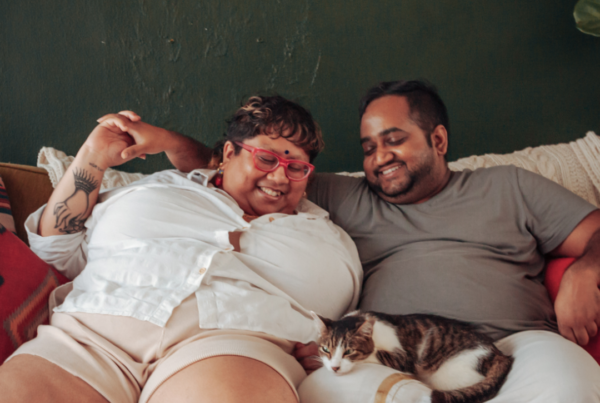Am I or anyone I know facing seggsual abuse in an intimate relationship?
Many people are unsure if what they went through can be categorised under seggsual violence/trauma. First of all, let us make it clear: Seggsual violence/trauma is any act of seggsual nature that a person did not consent to. This happens both offline and online and to people of all genders. Examples includes r@pe, child seggsual abuse, child manipulation by an older person of any gender, unwanted kissing and touching, street harassment, forcing to watch pornography, unwelcome online remarks/threats/abuse based on gender or seggsual orientation, sending or demanding n^des and sharing private photos or videos.
Intimate Partner Seggsual Violence (IPSV) is when an intimate partner is the perpetrator. It is, by general definition, not limited to marriage or a certain gender or seggsual orientation.
Is seggsual violence in relationship that common though?
Before getting into the staggering statistics and facts, we have to acknowledge that seggsual violence sometimes comes with physical and/or emotional violence. Now, to the numbers. As per the latest report by National Family Health Survey (NFHS-5):
- About 12 out of 50 women who were ever married have faced seggsual violence from their current spouse.
- Seven out of 50 women who were ever married have faced seggsual violence from their former husband.
- Eight out of 50 women who were never married have faced seggsual violence from their current or former boyfriend.
- Only seven out of 50 women who faced physical or seggsual violence have sought help from a medical professional, social service organisation, police or lawyer.
- The rate of seggsual violence declines with education (9% to 3%) and wealth (10% to 3%), but the problem still exists even in the cream of the society.
The survey did not define seggsual violence, but the ever-married women were asked if their (last) husband ever forced them to have seggsual intercourse or perform any seggsual acts even when they did not want to. That dismisses the various other kinds of seggsual violence against women.
Speaking of seggsual violence in marital relationship… Did you know that India is one of the 34 countries that explicitly decriminalises marital r@pe? The Protection of Women from Domestic Violence Act of 2005 addresses seggsual abuse. However, it offers only civil remedies like protection order (prohibiting the abuser from committing further acts of domestic violence), residence order (prohibiting the abuser from dispossessing the victim), interim order (for immediate relief), custody (of children) order, compensation (for the injuries and harms)order and monetary relief (for medical expenses, loss of earnings and damage to property).
What about men, transgender and non-binary folks, and same-sex couples?
Sadly, but unsurprisingly, there is not enough research, survey and literature available about seggsual violence faced by these communities. Even the studies available in other parts of the world are deeply flawed in methodology. Estimating the rate of seggsual violence in these communities is challenging due to low and convenient sample size, underreporting, difficulty distinguishing between perpetrators and victims, the lack of a clear definitions and the general taboo associated with these communities and topics.
Under Transgender Persons (Protection of Rights) Act of 2019, seggsual crimes against transgender people are punishable by a minimum of six months and a maximum of two years in prison with fine.
The Protection of Women from Domestic Violence Act of 2005 extends protection against domestic violence to women in live-in relationships. This does not take into consideration the gay and non-binary couples in the country.
What does seggsual trauma do to a victim/survivor?
The initial reaction to seggsual trauma can result in feelings of shame, guilt, embarrassment, confusion/ shock and/or anger. If untreated, the survivor might face lifelong symptoms or conditions such as anxiety, depression, suicidal ideation/attempts or even becoming a further target for domestic violence from same or different people. Hyperseggsuality and hyperarousal, performative seggsual encounters can also be outcomes of seggsual trauma.
As a personal experience, I can tell you that seggsual violence can make one lose their self worth. It can make wonderful people think they are not worth dignity and respect in relationships, or even at work, everything bad that happens to them there on is somehow by their own design. It causes a broken self image, a distorted vision of one’s self that does not deserve kindness and autonomy. With prolonged mental health care and support from loved ones, survivors can come back to feeling empowered. But the road is long and not linear. As filmmaker Jenifer Fox put it, “… seggsual abuse is a bullet that explodes in you into a million pieces. And you can’t really figure out all the pieces. Often, it takes decades…”
What can I do when facing seggsual violence in a relationship?
We understand that you may not want to report or speak about domestic violence due to fear of escalation, harm to you or people that matter to you, or other personal reasons.
If you want to seek support, here are some of the options to consider:
- Speak to a trusted friend or family member who would think and act cautiously and prioritise your health and safety.
- The single emergency helpline number for immediate assistance is 112. You could also call the domestic violence helpline by the National Commission for Women +91 72177-353-72.
- The emergency number for transgender people and men who have sex with men (MSM) is 1800-2000-113.
- Here is a directory to find organisations that offer support for victims of domestic violence in India.
What if someone I know is facing seggsual violence in a relationship?
The Good Friend Guide by Chayn offers simple and practical ways to support someone who is going through seggsual violence.






Thank you for presenting both sides of the argument in your post. It shows a fair and balanced approach. click here for additional insights.